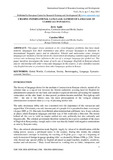| dc.description.abstract | Teaching at the university makes me realize that something needs to be done in the teaching of language for learning. Observation shows that students arrive at university without the requisite language skills (Tekeste, 2006; Aspen, et al., 2009), to benefit fully from the kind of independent work that is expected of them, and that should, by and large, be buttressed by ingrained language and study skills which they should have acquired and honed at secondary school. In addition, more than half of the students I teach at university cannot succinctly express themselves in English and are unable to write effectively
in English, the language of instruction. The studies cited in the paper are not confined to Kenya; there is the SAQMEC II Study which covered 15 African countries at primary level. The UWEZO study of 2012 covered Kenya, Uganda and Tanzania, while the report on Ethiopia covers the Ethiopian situation. The study covered undergraduate writing errors from 201 students, while the Ethiopian data covers PhD theses from 7 candidates. What the data shows is that mastery of the language of instruction across the board is not what it should be and candidates struggle to express themselves both in writing and speech. In attending PhD vivas, I have come across candidates who are unable to express themselves orally using English, even when they are English language majors. The paper argues, based on existing research, that language is a big determinant of reading (Winne, 1993; Kinstch, 1991; Olshavksy 1977; Kembo, 1994, which, in turn, is a big part of independent learning, thereby determining school success. The paper further contends that in circumstances where input from the environment is limited, as is often the case
in most second and foreign language contexts, the student must be aided to get it from alternative sources: extensive reading programs that are monitored until they become habitual, clubs, listening to radio and television as part of teaching and learning, production and use of self-learning materials that learners can utilize in schools and at home at affordable costs. Alternatively, we must revert to the use of African languages because of the benefits accruing: early mastery, conceptualization of the world, fluency, and the freedom to use their mental capacities and resources for grappling with content rather than with mastery
of language at the same time. | en_US |


